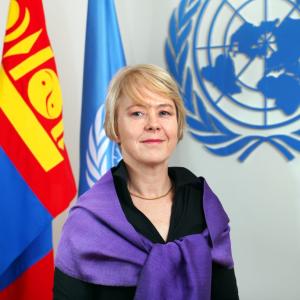Ms.A.Undraa, Member of Parliament of Mongolia
Mr. B.Bayarsaikhan, Chairman of the National Development Agency,
Representatives of the Government, CSOs, academia, private sector and international partners,
I am excited to see you all taking part in the national consultation for Mongolia’s Voluntary National Review of its progress in implementing the Sustainable Development Goals. Mongolia’s first VNR presents a snapshot of where it stands on the SDGs today. And today’s consultation aims to validate the review’s recommendations, which are now almost finalised.
The SDGs are the most ambitious goals the world has ever set. They aim to end poverty, while ensuring the survival of our planet, all by the year 2030.
This is only possible if governments, corporations, civil society and the public work together. And this first VNR provides an excellent platform to deepen SDG-awareness across stakeholders, as well as to strengthen consensus around coherent, coordinated action across every sector. Because progress under one target supports progress under others. For example, cleaner energy not only slows climate change, but also lowers pollution, improving health.
Mongolia’s existing development process however has addressed actions for different sectors separately. To overcome the country’s most urgent challenges though, they must be taken together.
The Report takes air-pollution as a key example of the interconnectedness of the issues we face, and the responses we need. Unequal opportunities and extreme weather caused by climate change have forced thousands to migrate to the capital and live in ger districts, without central heating. This has driven many to burn coal to stay warm in freezing winters, a key cause of Ulaanbaatar’s hazardous air.
Poverty-induced air pollution demonstrates the interdependent nature of social and environmental concerns addressed by the SDGs, and why coordinated responses, across all sectors and stakeholders, are key to tackling them.
To facilitate this, the report further analyses air pollution from a systems lens, providing a model that can be applied to other sustainable development hurdles too. Exploring the barriers to overcoming air pollution can also lead to greater actions to overcome them, and identify who could do what to ensure this in future.
The report highlights the risk of inequality preventing, or reversing, development gains. The SDGs are a promise to ‘leave no one behind.’ So I am glad to see this report also identifies vulnerable groups who are being left behind in Mongolia. Women, young people, the elderly, the disabled and the poor remain most at risk. Understanding who is vulnerable and why, as well as how to help, is vital. With the country’s rise in poverty – from about one in five people in 2014, to one in three in 2016 – it’s crucial that the benefits of its recent recovery in growth (reaching 6.9% last year) are more widely shared and are reaching those furthest behind, first. Only then can we tackle key problems that inequality and poverty further exacerbate – including for example air pollution.
Mongolia has shown its commitment to a more sustainable future. It was one of the first countries to adopt the SDGs. And it has taken action to localize them, putting in place its own Sustainable Development Vision as well as regulatory and institutional frameworks for SDG planning, in addition to developing methods for SDG-informed budgeting. But even more must be done to ensure Mongolia can meet the SDGs within the next decade. In particular, the report stresses the importance of policy coherence, institutionalizing implementation across government ministries and levels, as well as setting up monitoring and evaluation systems to report on progress, so ‘what gets measured, gets managed.’
The VNR, and process of producing it, represent a great opportunity to unite different stakeholders in an alliance for action on the SDGs. I encourage you all to take part in carrying out its recommendations, and monitoring the SDGs’ progress in Mongolia. Because sustainable development is everyone’s responsibility. While the government must lead by setting policies to support the SDGs, we estimate that companies must provide up to two-thirds of the financing to achieve them. Individuals must also change their behaviour, by making more sustainable choices, like walking or taking public transport when possible.
We all make a difference. Working together – across political parties, across industries and across society – we can meet the SDGs, and the world that they seek to create: a society that includes everyone, and a planet that can support everyone. The UN stands ready as ever to support Mongolia, and all its stakeholders, as it continues on that journey.
The time to act is now, and we must act as one. I wish you all fruitful discussions towards this.
Thank you!

















